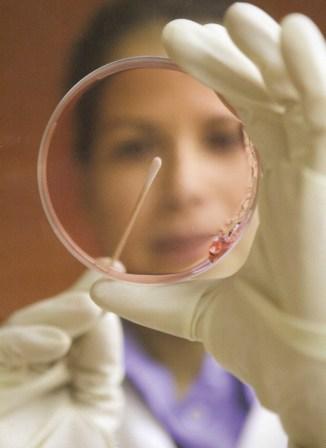
Recently there has been a great deal of interest in the medical world about the potential of Pluristem cells to prevent Radiation Sickness and how Hadassah used them to save the life of a little girl.
This article was originally published by Hadassah International in May 2012.
Using placental mesenchymal stem cells–which proved effective in pre-clinical trials–physicians at the Hadassah University Medical Center rescued the life of a seven-year-old Romanian girl whose two bone marrow transplants were not triggering the repair needed to save her life.
![pluristem_logo[1]](http://v2023.hadassahinternational.org/wp-content/uploads/2015/04/pluristem_logo1.jpg) “B” was suffering from severe aplastic anemia, a disorder where the bone marrow does not produce sufficient new cells to replenish the blood. For the last 10 months, she had been hospitalized at Hadassah in critical condition. While her body accepted the two transplants from two different donors, the donated bone marrow was unsuccessful in getting her body to take over the replenishment process and produce new red blood cells. Prof. Reuven Or, head of the Sidney Weisner Department of Bone Marrow Transplantation and Cancer Immunology, decided to speak with Prof. Rafi Gorodetsky, Director of Hadassah’s Biotechnology and Radiobiology Laboratory in the Sharrett Institute of Oncology, who was conducting stem cell research sponsored by Pluristem Therapeutics, an Israeli bio-tech company which develops placental mesenchymal cells. Prof. Gorodetsky’s pre-clinical trial showed success in treating radiated mice with the Pluristem cells. (See ”Placental Cells Found to Have Potential to Mitigate Acute Radiation Syndrome,” in http://v2023.hadassahinternational.org/news/article.asp?id=2020 October 2011.)
“B” was suffering from severe aplastic anemia, a disorder where the bone marrow does not produce sufficient new cells to replenish the blood. For the last 10 months, she had been hospitalized at Hadassah in critical condition. While her body accepted the two transplants from two different donors, the donated bone marrow was unsuccessful in getting her body to take over the replenishment process and produce new red blood cells. Prof. Reuven Or, head of the Sidney Weisner Department of Bone Marrow Transplantation and Cancer Immunology, decided to speak with Prof. Rafi Gorodetsky, Director of Hadassah’s Biotechnology and Radiobiology Laboratory in the Sharrett Institute of Oncology, who was conducting stem cell research sponsored by Pluristem Therapeutics, an Israeli bio-tech company which develops placental mesenchymal cells. Prof. Gorodetsky’s pre-clinical trial showed success in treating radiated mice with the Pluristem cells. (See ”Placental Cells Found to Have Potential to Mitigate Acute Radiation Syndrome,” in http://v2023.hadassahinternational.org/news/article.asp?id=2020 October 2011.)
After receiving the approvals of Hadassah’s Helsinki Committee and Israel’s Ministry of Health, Hadassah’s physicians gave “B” two shots of the Pluristem cells, injecting them into her thigh muscle. The recovery was so significant that “B” was able to leave the hospital.
“This is a moment every physician and researcher waits for,” says Prof. Or. “We now have a new tool and I always prefer to use biological substance over chemical components.” Prof. Or cautions, however, that this is only one single case and the treatment still requires full scientific exploration and validation. Scientists at Pluristem and Prof. Or will now discuss “next steps” and how to widen the scope of their studies.
“Whatever happens next,” commented a Hadassah staff member “we can enjoy another story of life saving at Hadassah–a combination of the ingenuity of an Israeli biotech firm, Hadassah research, and Hadassah clinical excellence.”
